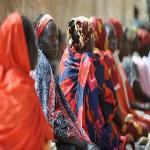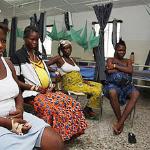April 21, 2011

Photo: AFP
Expectant mothers wait in queue for consultation at the maternity ward of the Medecins Sans Frontieres (Doctors Without Borders-MSF) Aweil civil hospital, the only hospital in Sudan's Northern Bahr al-Ghazal state (File Photo - January 26, 2011)
A controversial drug that can save women from bleeding to death after delivery has shown promising results in trials conducted in Senegal.
Everyday, according to the World Health Organization (WHO), an estimated 1,000 women die each day during complications with pregnancy and childbirth. WHO research shows 99 percent of these cases occur in developing countries where a quarter die from severe post-delivery bleeding.
The drug misoprostol, sold under the name Cytotec in the United States, may offer an easy and cost-effective solution. It is sold in tablet form and remains stable at room temperature, which makes it practical in hotter climates. Misoprostol trials have been conducted in developing countries such as Nepal, Afghanistan, Nigeria and Senegal to help women without access to proper healthcare facilities or trained staff.

AFP
Pregnant women watch television as they wait in the prenatal ward at Princess Christian Maternity Hospital in Freetown, Sierra Leone (File Photo)Doctor Bocaf Daff is in charge of the reproductive health division at the Ministry of Health and Prevention in Senegal. He has been leading a USAID-funded research project on misoprostol since 2008. They have tested its use after the delivery of more than 300 babies at community health clinics in two regions in Senegal.
Dr. Daff says patients were very willing to take part in the study, and in 80-85% of all cases the tests were successful. But to be sure their findings are consistent, they need to expand to a larger scale and ensure that all staff is skilled in how to follow the procedures accurately.
Controversy
Misoprostol is a controversial drug within the sexual and reproductive health communities. It was originally developed in the 1980's to treat ulcers, but is also commonly used to terminate pregnancy.
Dr. Daff says he knows it can be very dangerous, if it is misused to perform abortions. So health care providers have to be careful. But Dr. Daff says he is confident that misoprostol can be used without problems if medical personnel are properly trained.
Reducing the rate of maternal deaths by three quarters between 1990 and 2015 is one of the eight Millennium Development Goals. In most of sub-Saharan Africa, less than two thirds of women have access to a skilled health worker during delivery. This puts them at much greater risk of complications. And when a woman dies, the chances her own baby will survive are slim.
Saving lives
Thilde Knudsen is a midwife and leader of the Intersectional Working Group on Sexual and Reproductive Health for the aid group Doctors Without Borders. Her group uses misoprostol for postpartum hemorrhaging in countries around the world.
"It plays a tremendous role in saving women's lives, because a lot of maternal death, especially in Africa are due to PPH - so postpartum hemorrhage - and to have a drug that can be administered by lesser skilled staff and be kept without a cold chain, so without a refrigerator, it is definitely one step forward in having that accessible in a delivery facilities for example in Africa and that will help," said Knudsen.

AFP
An Amnesty International member unfolds a banner as she prepares for the campaign against maternal deaths in Freetown, Sierra Leone (File Photo)In Senegal specifically, UNICEF estimates that for every 100,000 live births 410 mothers will die. In developed nations this number is closer to nine. Dr. Daff is confident the rate of maternal deaths in Senegal has gone down, but he does not yet have exact numbers.
Dr. Daff says his job is to fight against maternal mortality and child deaths in Senegal, and he will use whatever means he can. A woman who is hemorrhaging post-delivery and is more than 15 kilometers from the nearest hospital or health clinic might die before she gets help. He says that if they have the chance to test a drug that may help these women, then why not.
Awaiting approval
The World Health Organization has not formally approved misoprostol for treating postpartum hemorrhaging. Dr. Daff says that might make things easier but does not really matter.
He says many times they've approved something that actually puts doctors behind, and other times they deny something that later proves to be good. So somewhere along the way countries have to take control of their own research; to experiment, validate and test whatever may help in the development of science.
With a testing protocol that is validated by an ethics committee, Dr. Daff says there is no stopping his group from continuing their research into reducing maternal mortality.